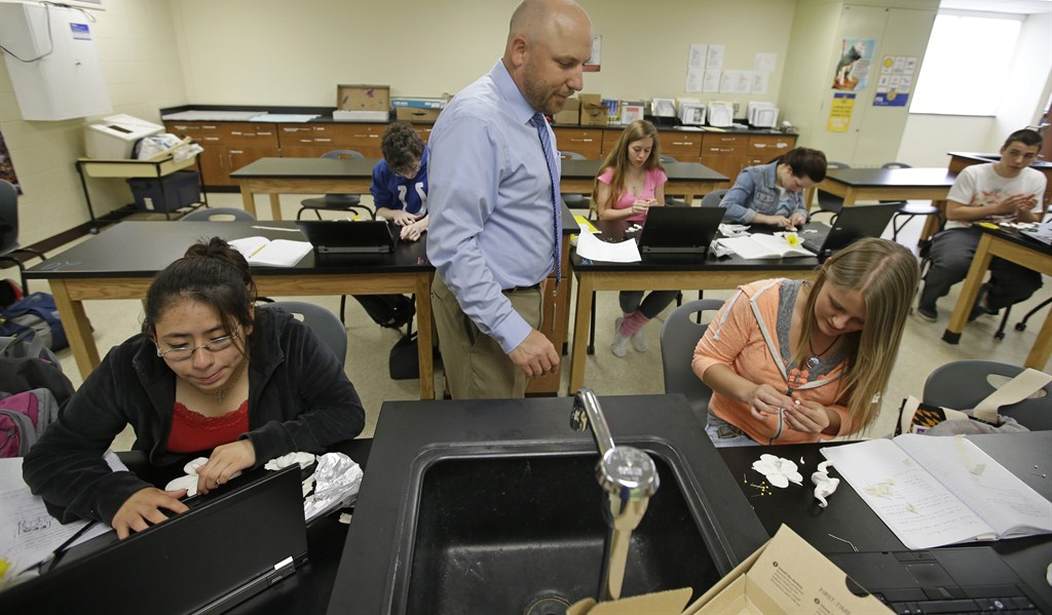Education has become a major issue in the Texas governor's race, with six months to go.
The differing approaches unveiled by the two major candidates for governor tell us a lot.
An examination of Democratic state Sen. Wendy Davis' education reform proposal shows the plan clearly refuses to increase accountability and competition in the public education system, opting instead for the tired, liberal trope of "more funding."
Davis' plan must have made the teachers unions hearts flutter. Indeed you could call it the best plan the teachers unions could buy.
Davis, of Fort Worth, has accepted more than $100,000 from teachers unions in her short political career (more than $26,000 from Texas AFT, more than $63,000 from the Texas State Teachers Association and more than $13,000 from ACT for Texas Classroom Teachers Association).
All reasonable Texans want to see public education in Texas succeed. But funding levels alone are not a sufficient metric.
The District of Columbia school system spends more per pupil than any jurisdiction and has terrible achievement results.
Instead, the metric should be, is our public education system improving, does it offer choices to parents and is it accountable?
Davis doesn't even attempt to create an education reform plan that addresses those concerns.
In 2009, Davis supported legislation (SB 3, floor amendment 8) that limited the ability of the Texas education commissioner to intervene or sanction failing campuses if other campuses in the district meet "minimal standards of performance."
Who could possibly be against closing failing schools? Teachers unions - and if they are against it, then so is Wendy Davis.
Davis, in running for governor, is pushing "universal pre-K," the kind of focus-group-tested phrase that parents generally like.
Does the cost matter? Will it work? What are the accountability measures?
These are inconvenient questions.
When she released her plan, The Dallas Morning News' Gromer Jeffers reported that Davis "did not say how much her proposals would cost or how she would pay for them."
Eventually she figured out the cost. Davis wants to spend $750 million every year on universal pre-K. Her opponent in the gubernatorial race, Attorney General Greg Abbott, instead wants a "gold plan" for high-risk children that would need to prove it is successful before it is expanded, and would cost $188 million over two years, about one-fifth of Davis' proposal.
The Davis campaign spent weeks hyperventilating over a footnote in Abbott's lengthy proposal.
Davis incredulously charged that Abbott wanted to force 4-year-olds to undergo standardized tests, which PolitiFact ruled as "Mostly False."
This followed Davis claiming Abbott said expanding pre-K "would be a waste," which PolitiFact also ruled as "Mostly False," since Abbott said that "it would be a waste to offer pre-K to more students - without addressing quality."
The Texas public education system is improving.
The Texas Education Agency announced that the class of 2012 had the highest graduation rate in state history - 87.9 percent. This included all-time highs among white students (93 percent), Hispanic students (84.3 percent) and African-American students (83.5 percent).
So Davis' repeated claims that education has been gutted in Texas simply do not wash.
Yes, education funds were cut in 2011 when we faced a budget shortfall. Most of those cuts were replaced in 2013. The Legislature also passed important bills to reduce testing and expand charter schools.
In 2015, the Texas Legislature needs to move to improve choice in education by introducing competition into the market. This will foster innovation and help prevent children from being trapped in failing schools.
Abbott understands this and wants accountability, choice and high performance in education. Davis opposes school choice, believing that funds alone will solve every problem in education, much to the delight of the teachers unions.
Davis wants to put the teachers unions in charge, which results in trapping children in the status quo.
Abbott wants to empower parents, school boards and local educators to make decisions and improve our schools.
Favoring Teachers' Unions Over Students
The opinions expressed by columnists are their own and do not necessarily represent the views of Townhall.com.

Advertisement
Recommended
Trending on Townhall Videos
Advertisement
Advertisement
Advertisement
























Join the conversation as a VIP Member